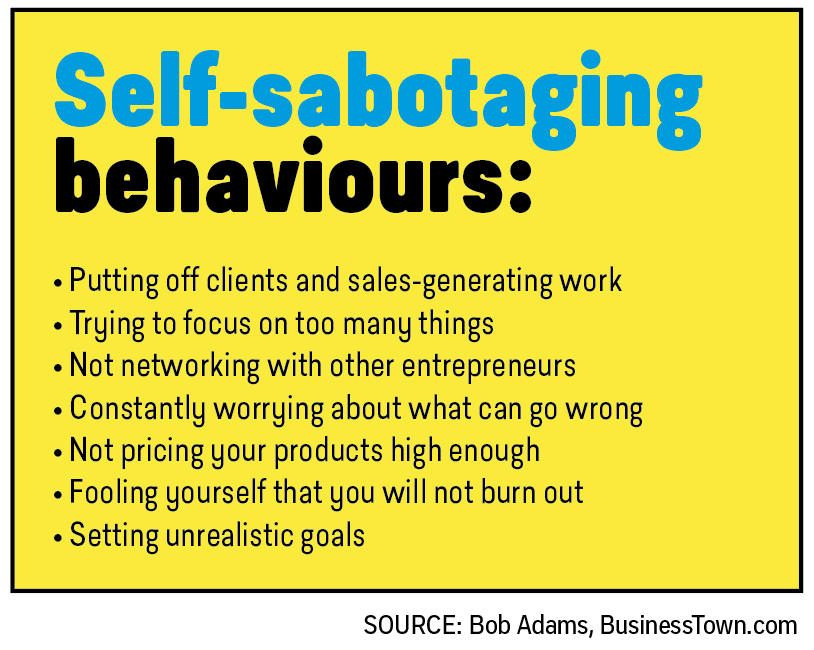As humans we are all guilty of self-sabotage at some stage of our lives. We tend to procrastinate. We have negative self-critical thoughts. We get distracted easily. We tend to be overly perfectionistic.
The same behaviours, and many more, apply to business owners. In the case of small businesses this can have a significant impact on the bottom line and the success of the business.
While entrepreneurs overcome enormous obstacles and achieve great heights in areas that appear impossible, they also make their own lives far more difficult than it needs to be, says Jenny Retief, CEO of Riversands Incubation Hub. The hub is currently home to over 160 small businesses.
The fear
One of the most common self-sabotaging behaviours is not recognising fear, writes Rob Adams, founder of BusinessTown, on his website.
“We need to recognise the innate human fear of failure that may be keeping us from charging into a new business, creating major new products, approaching that huge client prospect or just making that next important sales call.”
Written at the top of his daily calendar are the words: “What would I do if I had no fear?”
Adams, who is no stranger to failure, says self-sabotage can be incredibly damaging. Business owners keep themselves busy with activities that are a poor use of their time or, worse, a total waste of their time.
“Or, even worse than that, they may be activities that threaten the very existence of your business.” Often entrepreneurs are unaware, or even in denial that they are sabotaging themselves.
In many instances it is just about not following the basics, says Retief. “They will put a huge amount of effort into networking and making an initial entrance into a potentially viable client prospect, but then they fail to follow up. They get an invitation to quote, but they do not respond promptly in a professional manner.”
The plan
Diving into the work without a proper plan is the number-one self-sabotaging behaviour, says Adams.
Entrepreneurs work hard and long hours, doing the same kind of work that they have done in the past without giving much thought to alternative ways of doing the same things. “Or we fail to realise that there are different things we could be doing that might be more important in driving the business ahead.”
Retief says using “design sprints” – especially for start-up companies – is very effective. It is a technique that can offer you a “tight and structured way” to describe what you have in mind, getting the prototype in place and testing the prototype with real clients in a way that will give you a meaningful idea of what kind of response you are going to get.
This is different from a survey, she says. In a survey a person might say they would buy your prototype if it was available. But when someone has to put their hand in their pocket, things change.
Her advice is to take the lean start-up approach. Create a minimum viable product that you have not polished to death yet but which meets the core need and that you can go to market with.
“Sometimes you will find that the feature you like most is not the reason why clients buy your product. They may be after some other aspects and you should switch off pouring all your energy into your sexy feature and focus on what clients really want.”
Entrepreneurs sometimes “want everything to be perfect before even starting a venture, then lose too much time”, warns Retief. Too often entrepreneurs “burn” through their entire start-up capital wanting to get it right. This risk can be contained by taking on smaller chunks and by trying to be as objective as you can to ascertain how you are being accepted by the market. “There is no such thing as zero risk in small businesses, so just start, and respond to issues as they happen,” she says.
The curious mind
Retief adds that as businesses grow, it is vitally important for owners to retain their curiosity about their clients. Holding on to that can switch you out of defensive mode into interested mode, “even if your hackles are up because your customer or prospective customer has made a statement that you think is dissing your product or is inaccurate”.
She says it is hard work to make business owners understand that honest feedback is absolutely precious. Understanding the value of feedback can unlock huge potential.
Another problem is that people are intrinsically polite and kind. “If you can find out why they are not interested in your product you can modify your pitch.”
A business owner does not have to agree with the feedback – but you have to listen, rather than become defensive.
Entrepreneurs are passionate by nature. Therefore they tend to jump in mid-conversation to suggest features that may meet the needs of their customers; but without having heard the real need.
“They dilute their ability to close the sale because they used their ammunition along the way and also mildly irritated the client.”
Two minds are better than one
Retief says they have found that businesses who have co-founders with complementary skills have higher rates of success than single-person founders.
“You will find that people have the least time for the activity they are least comfortable doing… In an ideal situation you want two heads – a partner or someone with significant skin in the game who has an interest in the things you do not have an interest in.”
She says it is important for business owners to recognise that they’re not the master of all the tasks. At the same time, entrepreneurs should learn to delegate to someone with the right skills, instead of simply abdicating those tasks.
In short: Identify your weak spots, master them sufficiently to understand it, and then delegate it.
This article originally appeared in the 20 June edition of finweek. Buy and download the magazine here or subscribe to our newsletter here.




 Publications
Publications
 Partners
Partners












